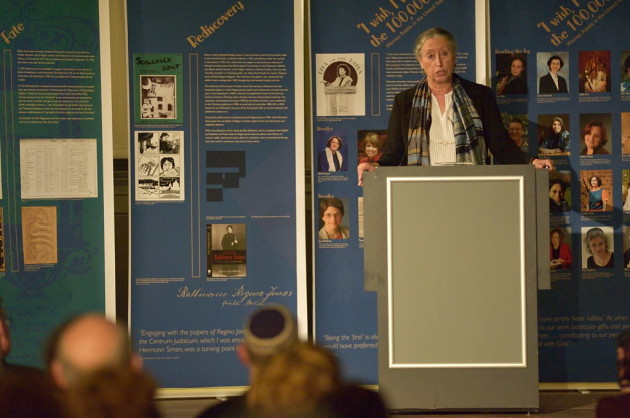
by admin
Women Who Became Rabbis Against the Odds

Dr. Rachel Elior at the Centrum Judaicum in Berlin. Photo by Tobias Barniske.
“If it doesn’t exist and you want it, it is your responsibility to create it,” avowed Rabbi Lila Kagedan at the fall conference in Berlin and Potsdam on “The Role of Women’s Leadership in Faith Communities: Marking 80 Years of Women in the Rabbinate.” Kagedan is a recent graduate of Yehsivat Maharat, the Orthodox rabbinical school for women located in New York City.
Rabbi Regina Jonas literally hovered over our proceedings, her photo projected on a screen high above the stage. Yet, back in 1972, when Sally Priesand was ordained a Reform rabbi, Jonas’s ordination in Nazi-infested Europe in the 1935 was little more than a footnote in the story of women’s road to ordination.
Two decades later, thanks to the persevering scholarship of Katharina von Kellenbach and Elisa Klapheck, Jonas’s story has entered into our collective memory. At the conference, the two joined Budapest filmmaker Diana Groó, director of “Regina,“to discuss the challenges they faced “to dig Regina Jonas out of the ashes of Auschwitz.” Ordained in 1935, Rabbi Jonas had preached and taught in Berlin and in Theresienstadt before she was murdered by the Nazis. In 2014, a delegation, including the first Reform, Reconstructionist, and Conservative female rabbis and the Orthodox Rabba Sara Hurwitz (the title the Hebrew feminine for rabbi), visited the places Jonas had lived. Their pilgrimage inspired the University of Potsdam and the Abraham Geiger College, the first liberal rabbinical seminary on the continent since the Holocaust, to convene this conference.
Over two days an international gathering of more than 100 heard in my opening address the challenges the first women to enter the rabbinate had faced. Like “monkeys in a cage,” they were expected to perform and do tricks, quipped Kinneret Shiryon, the first woman rabbi in Israel. Scholars present included Shuly Rubin Schwartz and Karla Goldman. And Christian and Muslim scholars spoke of roadblocks to teaching and leading in their faiths. In a panel chaired by Anna Azari, Israel’s ambassador to Poland, scholar Katarzyna Czerwonogóra dispiritingly concluded: “Women in the Polish Jewish community are invisible or marginalized or instrumentalized.” Marie-Theres Wacker, of the Catholic theological faculty at Münster University, ruefully remarked how she envied the women who had become rabbis; her tradition has no place for women in the ministry.
Rabbi Jacqueline Koch Ellenson, former director of the Reform Women’s Rabbinic Network in the U.S., asserted that “feminism has become the agent of change.” That was evident in Kagedan’s account of her journey into the Orthodox rabbinate; she is the first graduate of Yeshivat Maharat to take the title rabbi.